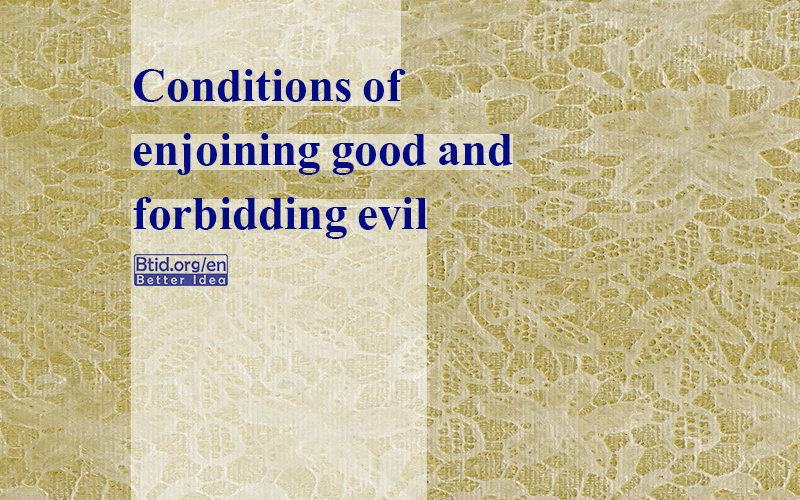-Enjoining good and forbidding evil has conditions that when those conditions are not met, it is not obligatory for a person to do it. These conditions include knowledge of good and evil, the possibility of influence, insisting on sin and not being corrupt, each of which we briefly describe:

Enjoining good and forbidding evil
1. Knowledge of good and evil
The first condition of enjoining the good and forbidding the evil is knowledge of the good and the evil. that is, the one who enjoins and forbids must know the good and the evil. otherwise he is not obligated to enjoin the good and forbid the evil. rather he should not do such a thing. Because it is possible due to ignorance to command evil and forbid what is good. therefore, the prohibition of denying someone whom we do not know whether his work is haram or not. (for example, it is not clear whether the music he is listening to is vulgar and haram or halal). then it is not obligatory for him to command.
2. Probability of effect
The second condition for enjoining good and forbidding evil is the probability of effect. that is, the one ordering and forbidding must give the possibility that his command and prohibition will have an effect and result, even in the future.
3. Insistence on sin
The third condition of enjoining the good and forbidding the evil is insistence on sin. that is, the guilty person must insist on the continuation of the sin. if it turns out that he gives up the wrong without being commanded and forbidden, command him and prohibition is not obligatory.
4. Enjoining good Not to result in corruption
The fourth condition of enjoining the good and forbidding the evil is not to be corrupt. that is, the command and prohibition must not lead to corruption. so if the command or prohibition causes corruption to the person who is ordering or forbidding or to another Muslim. corruption such as loss of life, reputation, or money. then, there is no obligation or prohibition. Of course, the obligee is obliged to consider the importance. that is, he must compare all the pros and cons between the corruption of the command and the prohibition. and the corruption of abandoning the command and the prohibition. Then s/he act on what is more important.
Conclusion:
Enjoining what is good and forbidding what is evil is obligatory if it meets the four above conditions. so if it does not meet one of those conditions, for example, it results to corruption, then it is not obligatory. even if it meets the other conditions.
In commanding the good and forbidding the bad, there is no condition that the command and the prohibition do not cause dishonor or lowering the respect of the person who left the obligation or performed the forbidden act. its conditions and customs should be observed. and its limits should not be exceeded. therefore, there is nothing wrong with dishonoring or lowering the respect of the person who commits the violation.[1]
References:
[1] Translated from Ayatollah Khamenei's treatise on practical rules:



